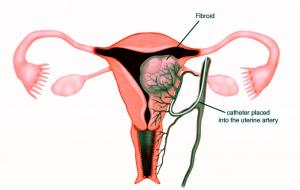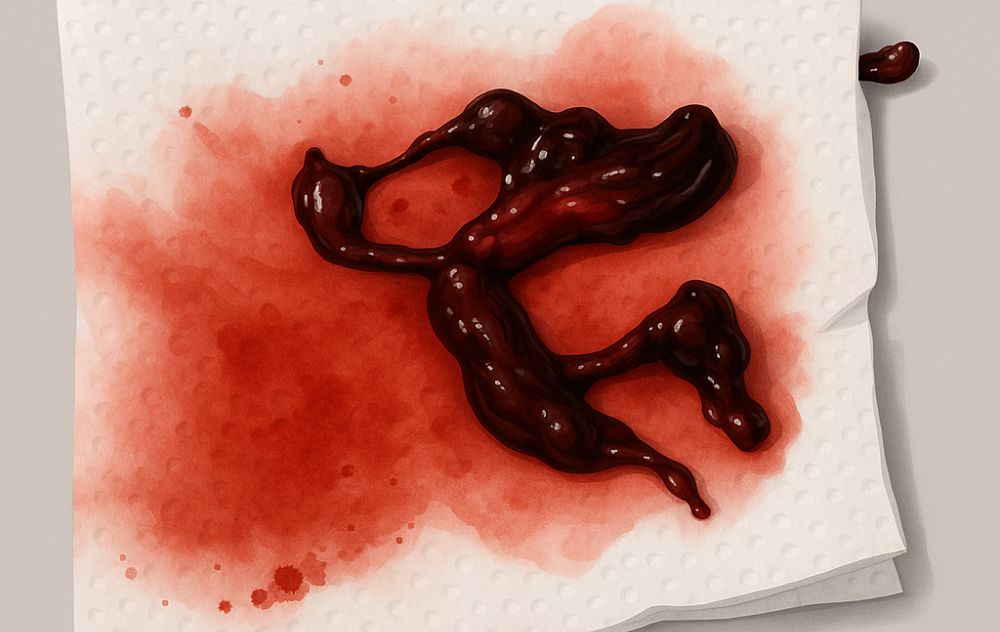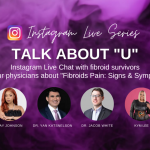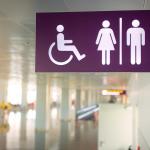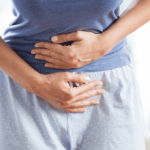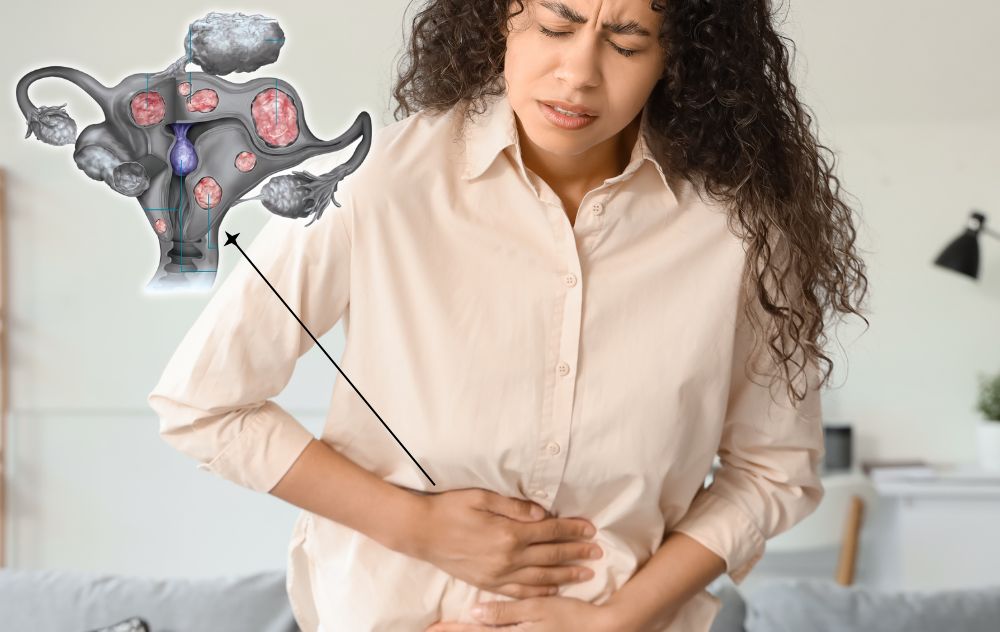
Fibroid sloughing, also known as fibroid degeneration or necrosis, is a natural process in which a uterine fibroid undergoes cell death and subsequent breakdown. In some cases, due to their rapid growth or a decrease in their blood supply, the fibroids can outgrow their blood vessels, leading to insufficient oxygen and nutrients reaching the fibroid tissue.
As a result, portions of the fibroid may start to die off. During fibroid sloughing, the dead tissue may disintegrate and be expelled from the body, often resulting in vaginal discharge containing blood and pieces of tissue. For some women, this may be uncomfortable and cause temporary symptoms, such as abdominal pain and cramping. However, it is usually not a cause for major concern. We encourage you to consult with a doctor specializing in uterine fibroids if there are any concerns or if the symptoms become severe to rule out any complications and ensure appropriate management.
Symptoms of Fibroid Sloughing
Many women experiencing fibroid sloughing report symptoms such as:
-
Vaginal discharge with a foul odor
-
Expulsion of grayish tissue or blood clots
-
Intense cramping or abdominal pain
-
Fever or signs of infection
-
Unusual vaginal bleeding
These symptoms can be mistaken for a miscarriage or infection, making medical diagnosis important.
How Long Can Fibroid Sloughing Last?
Recovery can range from a few days to a few weeks. Light activities are recommended, and full pelvic rest is encouraged for at least a week.
Can Fibroids Slough Without Pain?
Surprisingly, yes. Some women experience fibroid expulsion with little to no discomfort, especially if the fibroid is small and submucosal.
Fibroid Sloughing After Uterine Fibroid Embolization (UFE)
UFE is a highly effective procedure to treat uterine fibroids, and while fibroid sloughing is an infrequent occurrence, it may still happen in some cases. After undergoing a Uterine Fibroid Embolization (UFE), it’s completely normal for some women to experience cramping, fatigue, and sometimes even the release of fibroid tissue through the vagina, a process known as fibroid sloughing. These symptoms occur because the procedure deliberately blocks the fibroid’s blood supply, causing it to shrink, die, and in some cases, exit the body naturally.
Your interventional radiologist will make sure you’re prepared for this phase by prescribing pain medication and walking you through exactly what to expect during recovery. Still, if something feels unusual, whether it’s excessive bleeding, a foul odor, or unexpected discomfort—it’s important to reach out to your care provider right away. Better safe than sorry.
Once the recovery process is complete, many women experience lasting relief from the frustrating symptoms that brought them in. In other words, healing might come with a few bumps, but freedom from fibroids is well within reach.
Patients should be attentive to any changes in their vaginal discharge, particularly if it appears darker and contains clots or tissue fragments. Though fibroid sloughing is generally not a cause for major concern, promptly informing the healthcare provider about such symptoms allows for proper evaluation and reassurance.
Being vigilant and knowledgeable about potential post-UFE outcomes empowers patients to distinguish normal recovery from any unusual occurrences, ensuring a smooth healing process and providing peace of mind after this FDA approved fibroid treatment.
Call to Consult With a Fibroid Specialist
What Does Fibroid Sloughing Look Like?
Fibroid shedding, another term used for fibroid sloughing, is the expulsion of fibroid tissue from the uterus. It can present as a dark, clotted vaginal discharge containing tissue fragments, which may range in size and consistency. The shedding process typically occurs in response to fibroid degeneration or necrosis, where the fibroid tissue undergoes cell death due to being cut off from its blood supply. As the fibroid tissue disintegrates, it may be expelled from the body through the vaginal canal, causing temporary symptoms such as vaginal bleeding, cramping, and discomfort.
Can Your Body Expel a Fibroid?
In rare cases, the body may expel a fibroid through a process known as fibroid expulsion. This occurs when a uterine fibroid, typically a submucosal fibroid (located within the uterine cavity), becomes detached from the uterine wall and is subsequently expelled from the body through the vagina. Fibroid expulsion is more likely to happen if the fibroid undergoes degeneration or necrosis, leading to a loss of blood supply and weakening its attachment to the uterine lining. The process of fibroid expulsion can cause vaginal bleeding and may be accompanied by abdominal cramps or pain.
In most cases, fibroid expulsion does not eliminate all fibroids, and comprehensive treatment options should still be explored to address any remaining fibroids and manage symptoms effectively
What Are The Symptoms of Passing a Fibroid?
Passing a fibroid can be a rare occurrence, but when it happens, it may lead to distinct symptoms. As a fibroid undergoes degeneration or necrosis, the weakened tissue can disintegrate and be expelled from the uterus, potentially resulting in passing a fibroid. In rare cases, fibroid sloughing can lead to infection or sepsis.
Symptoms of passing a fibroid can include dark and clotted vaginal discharge containing tissue fragments, similar to a heavy menstrual period. This process may be accompanied by abdominal cramping or discomfort. In most cases, passing a fibroid is a natural part of the body’s healing process after undergoing treatments, but we encourage women to stay proactive on anything abnormal and to consult with their fibroid doctor.
Fibroid Sloughing Vs. Generation and Shedding
Fibroid sloughing, shedding, and degeneration are closely related but not identical processes. Fibroid degeneration refers to the internal breakdown of a fibroid due to a loss of blood supply, often causing pain, inflammation, and in some cases, fever. When the dead fibroid tissue detaches and exits the body through the vagina, it’s called fibroid sloughing—a physical expulsion that can involve tissue discharge, cramping, and a distinct odor. While fibroid shedding is not a medically defined term, it’s often used informally to describe the same phenomenon as sloughing.
Do You Have Additional Questions About Fibroid Sloughing?
If you are concerned about fibroid sloughing or have any questions regarding this rare occurrence, don’t hesitate to contact USA Fibroid Centers for expert guidance and reassurance. Our specialized centers have experienced doctors well-versed in diagnosing and treating uterine fibroids and their potential complications.
Connect with our team by calling 855.615.2555 or completing our online scheduling form for your initial consultation.

